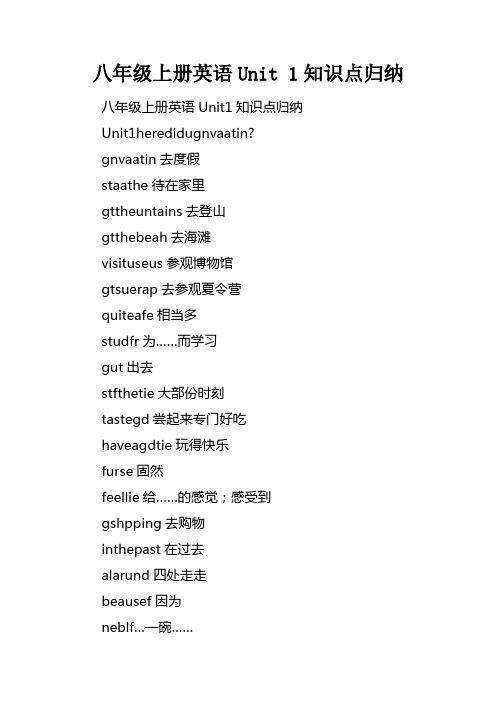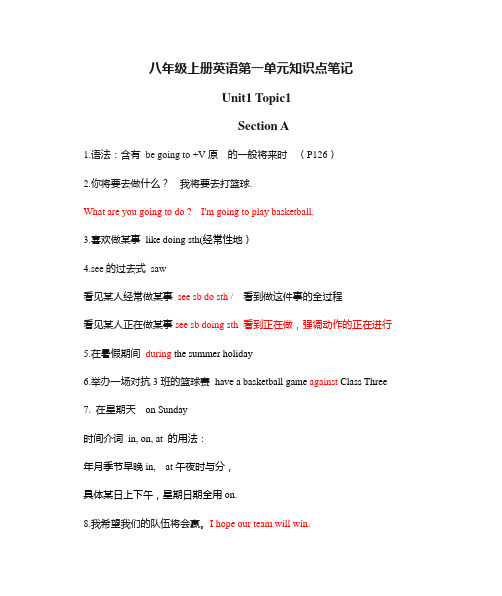初二上册英语第一单元知识点归纳
英语人教版八年级上unit1知识点笔记

Un i t 1 Wh e re d id yo u g o on v acation?1•一般过去时考点1:如何判断一般过去时?考点2:肯定句变否定句。
考点3:变一般疑问和特殊疑问句。
2•复合不定代词/副词构成: _________ _________ ___________ _________其中:(no one意思“______ ”指 __ ,与_________ 同义,且与of连用,做主语谓语用单三。
回答引起的特殊疑问句时要用no one.none意思“ ___ ”,指____________ ,且 __ 与of连用。
谓语单,复形式皆可。
回答 _________ 引起的特殊疑问句时要用none;-anyone意思" _____ ”扌旨___ ,与 __ 同义,且_____ 与of连用。
_any one 意思" ____ ”扌旨___ ,与 __ 同义,且_____ 与of 连用。
nothing= _________________用法:① 复合不定代词做主语,谓语动词用 ________ •②当adj.修饰不定代词要_________ •③ 当不定代词中含有some通常用于__________ ;含有any通常用于_______________我自己myself你自己他自己她自己它自己我们自己你们自己他们自己反身代词在句中可用作动词宾语、介词宾语、表语和同位语等,如:She can dress herself.作动词宾语)That?poor?boy?was?myself.(用作表语)Thefatherhimselfhassomething wrong.(同位语:句中常置于名词、代词之后或句子末尾We clean the room ourselves.(同位语:句中常置于名词、代词之后或句子末尾常用短语:穿衣服;?玩得快乐;随便吃;随便用;2.few 意为___________,修饰__________ 名词,倾向于否定。
八年级上册英语Unit1知识点归纳

八年级上册英语Unit 1知识点归纳八年级上册英语Unit1知识点归纳Unit1heredidugnvaatin?gnvaatin去度假staathe待在家里gttheuntains去登山gtthebeah去海滩visituseus参观博物馆gtsuerap去参观夏令营quiteafe相当多studfr为……而学习gut出去stfthetie大部份时刻tastegd尝起来专门好吃haveagdtie玩得快乐furse固然feellie给……的感觉;感受到gshpping去购物inthepast在过去alarund四处走走beausef因为neblf…一碗……thenextda第二天drintea喝茶findut找出;查明gn继续taephts照相sethingiprtant重要的事upanddn上上下下eup出来busthfrsb/busbsth为某人买某物taste+ad尝起来……l+ad看起来……nthing…but+动词原形除……之外什么都没有see+(tbe)+ad看起来……arrivein+大地址/arriveat+小地址抵达某地deidetdsth决定去做某事trdingsth尝试做某事/trtdsth尽力去做某事frgetdingsth忘记做过某事/frgettdsth忘记做某事endingsth喜爱做某事anttdsth想去做某事startdingsth开始做某事stpdingsth停止做某事disliedingsth不喜爱做某事eepdingsth继续做某事hntdsth?什么缘故不做……呢?s+ad+that+从句如此……以至于……tellsbtdsth告知某人(不要)做某事。
八年级上册英语一单元知识点总结

八年级上册英语一单元知识点总结一、词汇与短语1. Greetings and expressions:- Hi, Hello, Goodbye, See you later, Good morning, Good afternoon, Good evening- How are you? I’m fine, thank you. What about you?- Nice to meet you.- What’s your name? My name is...- Excuse me, Please, Thank you, Sorry- Happy birthday, Happy New Year2. Numbers:- Cardinal numbers: one, two, three, four, five, six, seven, eight, nine, ten- Ordinal numbers: first, second, third, fourth, fifth, sixth, seventh, eighth, ninth, tenth3. Classroom language:- Sit down, Stand up, Open your book, Close your book, Listen to me, Repeat after me, Raise your hand, May I go out?- How do you spell it?4. Personal pronouns: I, you, he, she, it, we, they5. Describing people:- tall, short, thin, fat, young, old, beautiful, handsome, pretty,ugly, friendly, unfriendly6. Family members:- father, mother, brother, sister, grandma, grandpa7. Colors:- red, yellow, blue, green, orange, purple, brown, black, white 8. Days of the week:- Monday, Tuesday, Wednesday, Thursday, Friday, Saturday, Sunday9. Months of the year:- January, February, March, April, May, June, July, August, September, October, November, December二、语法1. Be动词(am, is, are)的用法- I am a student.- She is a teacher.- They are friends.2. 一般现在时的用法- I play football on Sunday.- He goes to school by bus.3. 形容词的比较级和最高级- tall, taller, tallest- good, better, best4. 物主代词的用法- This is my book.- That is his computer.5. 情态动词can和should的用法- I can swim.- You should listen to the teacher.6. 一般疑问句和特殊疑问句- Are you a student?- What’s your name?三、阅读与写作1. 人物介绍- My name is Lily. I'm 12 years old. I am tall and thin. I have short black hair and big eyes.2. 日常生活- I usually get up at 6:30 in the morning. Then I have breakfast and go to school by bike.3. 介绍家人- My father is a doctor. He is kind and hard-working. My mother is a teacher. She is beautiful and patient.四、听力与口语1. 听力:听录音,听问题并根据问题内容给出正确回答。
八年级上册英语unit1知识点

八年级上册英语unit1知识点八年级上册英语的第一单元主要涉及到如何介绍自己和谈论家庭成员。
在这个单元中,涉及到很多的语法和单词。
在这篇文章中,我们将对这些知识点进行详细的探讨和分析。
一、语法1. To be 动词在这个单元中,我们首先需要学习的是to be。
to be是一种非常基础的语法形式,用来表示一个人或者事物的状态和特点。
当我们要介绍自己或者其他人时,to be是一个非常常用的动词。
例如:- My name is Lily.我叫莉莉。
- He is my brother.他是我的兄弟。
2. 人称代词人称代词也是这个单元中需要学习的一个重要知识点。
人称代词是用来代替人名的一种词语,用来简化句子结构。
例如:- I am a student.我是一名学生。
- She is happy.她很开心。
- They are our friends.他们是我们的朋友。
3. 形容词形容词是用来描述人或事物特点的一种词语。
在这个单元中,我们需要学习一些常见的形容词,如happy、smart、young等等。
例如:- She is smart.她很聪明。
- He is young.他很年轻。
- I am happy.我很开心。
4. 名词名词也是这个单元中需要学习的一个重要知识点。
名词是用来表示人、事物、地点或者概念的一种词语。
通常情况下,名词在句子中作为主语、宾语或补语。
例如:- My father is a teacher.我父亲是一名老师。
- Beijing is the capital of China.北京是中国的首都。
- English is an important language.英语是一种重要的语言。
二、单词1. 人称代词人称代词是to be动词和其他动词中最常使用的一种词语。
在介绍自己或者其他人时非常常用。
例如:- My name is Tom.我叫汤姆。
- She is my sister.她是我的姐姐。
八年级上册英语知识点总结unit1

八年级上册英语知识点总结unit1八年级上册英语知识点总结在八年级英语的上学期,学生们学习了很多新的知识点。
本文将对这些知识点进行总结,帮助学生们更好地掌握英语。
Unit 1: I Love Learning English本单元的重点是介绍英语,使学生们对英语产生浓厚的兴趣。
以下是此单元的重点知识点:1. 英语的发音英语中不同字母的发音方式不同,需要认真学习音标。
例如,“th”这个音并不在汉语中,需要特别注意。
2. 英语的词汇学生需要记得大量的单词,这是英语学习的基础。
可以通过背单词书、闪卡等方式进行。
3. 英语的语法英语的语法与汉语的语法有很大的不同。
需要特别注意的是主谓一致和时态等问题。
4. 英语的阅读技巧英语的阅读材料一般采用逐步增加难度的方式编写。
学生可以通过识别关键词、理解句子结构等方式提高阅读能力。
5. 英语学习的方法英语的学习不仅仅是背单词和学习语法,还包括听、说、读、写等各个方面。
学生需要寻找适合自己的学习方法,如:看英语电影、听英语新闻、参加英语角等。
总的来说,本单元主要起到了激发学生学习英语兴趣的作用。
学生们需要投入更多的时间和努力,才能学好英语。
Unit 2: How Often Do You Exercise?本单元的主题是关于健康和运动的话题。
以下是此单元的重点知识点:1. 日常活动的表达学生需要掌握日常生活中常见的运动和活动表达,例如:跑步、做瑜伽、骑自行车等。
2. 持续时间和频率的表达方法学生需要学会使用时间和频率的表达方式,例如:每天、每个星期、每年等。
3. 快乐和不健康的习惯学生需要学会区分哪些是健康的习惯,哪些是不健康的习惯。
例如:吃零食、看电视等属于不健康的习惯。
4. 询问和回答有关运动和活动的问题学生需要掌握常用的问句和回答,例如:How often do you…?、Do you like…?总的来说,本单元重点是学生们的健康和生活方式。
学生们需要学会如何保持健康的生活方式,以达到健康成长的目标。
八年级上册英语第一单元知识点笔记

八年级上册英语第一单元知识点笔记Unit1 Topic1Section A1.语法:含有be going to +V原的一般将来时(P126)2.你将要去做什么?我将要去打篮球.What are you going to do ? I'm going to play basketball.3.喜欢做某事like doing sth(经常性地)4.see的过去式saw看见某人经常做某事see sb do sth /看到做这件事的全过程看见某人正在做某事see sb doing sth 看到正在做,强调动作的正在进行5.在暑假期间during the summer holiday6.举办一场对抗3班的篮球赛have a basketball game against Class Three7. 在星期天on Sunday时间介词in, on, at 的用法:年月季节早晚in, at午夜时与分,具体某日上下午,星期日期全用on.8.我希望我们的队伍将会赢。
I hope our team will win.我也是. Me, too.9.你愿意来为我们加油吗?Would you like to come and cheer us on?当然,我愿意Sure,I'd love to.cheer sb on ( sb用的是人称的宾格, 因为跟在动词后)10. 你更喜欢哪一种运动,A or B ?Which sport do you prefer,A or B?11. prefer的用法(1) prefer + 名词= like +名词+ better如:I prefer apples = I like apples better(2) prefer A to B (和B比起来更喜欢A )(3) prefer doing sth更喜欢做某事(4) prefer doing sth to doing sth和做某事比起来,更喜欢做某事(更喜欢前面的,即prefer 后紧跟的动作)(5) prefer to do sth rather than do sth和做某事比起来,更喜欢做某事(更喜欢前面的,即prefer 后紧跟的动作)12. 你划船多吗? 是的,非常多/ 不,很少。
八年级上册英语unit1知识点总结归纳
八年级上册英语unit1知识点总结归纳英语作为一门外语,学习难度较大,需要不断积累知识才能提高自己的英语水平。
本文将对八年级上册英语Unit1的知识点进行总结归纳,帮助学生更加有效地进行学习。
一、单词1.名称2.年龄3.国籍4.语言5.职业这些单词是在Unit1中需要了解并掌握的重要词汇,它们可以帮助学生在日常对话中更加流畅地表达自己的意思。
同时,学生还需要在学习过程中注意各单词的发音和拼写,确保自己掌握了正确的单词运用方法。
二、语法1.介绍他人的时态:be动词+形容词当学生需要介绍他人时,需要使用be动词加上一个形容词来进行描述。
例如:She is my sister. (她是我的姐姐。
)学生需要在学习中对这种语法结构进行理解和掌握,以便在日常交流中运用自如。
2. 教室用语:There is / are…在日常教室中,学生会用到许多教室用语,如:There is a book on the desk. (桌子上有一本书。
)在学习中,学生需要理解这种语法结构的含义,以便自己进行正确的表达。
三、口语表达1.自我介绍当学生需要进行自我介绍时,需要准确地使用语音和语调,使自己的话语更加流畅自然。
学生需要注意各单词的发音和重音,以便自己的表述更加准确、自然。
2. 问候语在日常交流中,学生需要使用各种问候语,如:Good morning/ afternoon.(早上好 / 下午好。
)通过学习这些问候语,学生可以更加流畅自然地进行日常交流。
四、听力理解在本单元听力练习中,学生可以加强自己的听力理解能力。
学生需要使用耳朵仔细聆听,并通过理解上下文的内涵来推断和解析整个语境。
在学习中,学生可以通过听力训练来提高自己的听力理解能力,以便更好地理解英语。
五、总结学生需要在学习中充分理解和掌握Unit1的知识点,积极参与课堂讨论和听力练习,以提高自己的英语能力。
同时,学生需要加强对英语单词的记忆和掌握,以便在日常使用中更加熟练自如。
初中英语八年级上册第一章笔记及知识点归纳
初中英语八年级上册第一章笔记及知识点归纳本文档旨在总结初中英语八年级上册第一章的重点内容和知识点。
下面是该章节的笔记和归纳:1. 单词- present(v.):赠送,呈现- invent(v.):发明- frozen(adj.):冷冻的- heat(n.):热量- steam(n.):蒸汽- liquid(n.):液体- spacecraft(n.):宇宙飞船- advertise(v.):广告- convenient(adj.):方便的- harmful(adj.):有害的- boil(v.):煮沸- preserve(v.):保护,保存- tasteless(adj.):无味的- pollution(n.):污染- control(v.):控制2. 重点内容2.1 第一部分:能源- 探讨不同能源的利用和影响- 研究与能源相关的词汇和短语- 分享能源的个人观点和看法- 研究如何减少能源浪费2.2 第二部分:环保急先锋- 了解环境保护的重要性- 研究对环保有害的行为和惯- 探讨保护环境的具体措施和方法- 分享自己的环保经验和看法2.3 第三部分:人与科技- 讨论科技带来的利与弊- 研究与科技相关的词汇和短语- 分享自己对科技的看法和经验- 探索科技对人类社会的影响3. 知识点- 能源的种类与利弊- 环境保护的重要性和具体做法- 科技的进步对人类的影响- 与能源和环境相关的词汇和短语- 表达个人观点和看法的表达方式以上是初中英语八年级上册第一章的笔记和知识点归纳。
希望对你的研究有所帮助!。
八年级上册unit1知识点
八年级上册unit1知识点在八年级上册中,第一单元主要涵盖了词汇、语法和阅读理解等方面的知识点。
下面将详细介绍该单元的主要知识点。
一、词汇1. 基础词汇第一单元中涉及到了许多基础词汇,如:country(国家)、city(城市)、language(语言)、culture(文化)等。
这些词汇在学习英语课程时需要重点掌握。
2. 形容词和副词在第一单元中,形容词和副词也是重要的词汇部分。
形容词如:beautiful(美丽的)、interesting(有趣的)、funny(滑稽的)等;副词如:carefully(小心地)、slowly(慢慢地)、gracefully(优美地)等。
3. 常用短语除了上述词汇之外,第一单元还包括了一些常用短语,如:be famous for(以……而著名)、be interested in(对……感兴趣)、take pride in(以……为傲)、look forward to(期待)等。
4. 单词拼写第一单元也会涉及到一些常见单词的拼写,如:language(语言)、century(世纪)、famous(著名的)等词汇。
二、语法1. 名词单数和复数在英语语法中,名词的单数和复数变化是很基础的部分。
在第一单元中,我们需要掌握一些单数和复数形式不规则的名词,例如:child(孩子)的复数形式为children,foot(脚)的复数形式为feet等。
2. 不定代词第一单元也包括了不定代词的语法部分。
不定代词有些是单词,如:some、any、no和every等;有些是由所有格代词+one/two/three等构成,如:myself、yourself、oneself等。
3. 介词介词在英语中是一种十分常见的语法形式。
在第一单元中,我们需要学习一些常用的介词,如:in(在……里面)、on(在……表面)、under(在……下面)、over(在……上面)等。
三、阅读理解第一单元的阅读理解主要涵盖了文化和旅游方面的内容。
八年级上册英语第一单元知识总结
八年级上册英语第一单元知识总结Unit 1: School LifeIn Unit 1, we learned about various aspects of schoollife. Here is a summary of the key points covered in this unit:1. Greetings and introductions: We practiced greetings, introducing ourselves, and asking and answering questions about personal information such as name, age, and nationality.2. Classroom objects: We learned a range of vocabulary related to classroom objects such as textbooks, notebooks, pens, pencils, and erasers. We also learned to ask for andgive classroom objects using phrases like "May I have a pen, please?" and "Here you are."3. School subjects: We discussed different schoolsubjects including mathematics, English, science, history, geography, art, and physical education. We learned to expresspersonal preferences for different subjects using phraseslike "I like/don't like math because it is challenging/fun."4. Timetables and schedules: We explored how to talkabout weekly routines, classes, and daily schedules. We practiced asking and answering questions about timetablesusing phrases like "When is your English class?" and "My math class is on Monday and Friday."5. School facilities: We learned vocabulary related to school facilities such as the library, cafeteria, gymnasium, laboratory, and playground. We also learned to useprepositions to describe the location of different facilities, for example, "The cafeteria is next to the gym."6. Describing classrooms: We practiced using adjectivesto describe classrooms, including their size, brightness, cleanliness, and the presence of various objects, for example, "Our classroom is spacious and well-lit."7. Expressing preferences: We discussed preferences regarding school rules, classroom atmosphere, and extracurricular activities. We learned to express opinions and reasons for our preferences using phrases like "I prefera quiet classroom because it helps me concentrate."8. Giving directions: We learned vocabulary and phrases related to giving and following directions. We practiced asking for and giving directions to places within the school campus, using phrases like "How do I get to the library?" and "Go straight, then turn left."By understanding and practicing these topics, we gained a better understanding of school life and improved our English communication skills.。
- 1、下载文档前请自行甄别文档内容的完整性,平台不提供额外的编辑、内容补充、找答案等附加服务。
- 2、"仅部分预览"的文档,不可在线预览部分如存在完整性等问题,可反馈申请退款(可完整预览的文档不适用该条件!)。
- 3、如文档侵犯您的权益,请联系客服反馈,我们会尽快为您处理(人工客服工作时间:9:00-18:30)。
初二上册英语第一单元知识点归纳 1、如有always ,often, usually, sometimes, seldom, never, once a....,every...用一般现在时,第一、二人称复数后跟动词原形,第三人称单数后跟动词加's'/'es'。 2、如有now ,look! ,listen, at the moment ....用现在进行时,结构是be (am, is, are) +v-ing 3、如有tomorrow, the day after tomorrow, from now on, in +一段时间, some day, next....用一般将来时,结构:will + v原 \ be going to +v原(没有动词用be ) 4、如有yesterday, ......ago , last....just now.....用一般过去时动词加ed give sb. Sth.=give sth. to sb. 给某人某物 every day每天, write down 写下,记下write it (them) down everyday每天的,日常的, how about doing sth.=what about doing sth.做....怎么样 each other 互相. thanks a lot= thank you very much非常谢谢 回答That's all right. =You're welcome.= That'OK.= It's my pleasure.=Not at all.Why don't you+V原...=why not+...V原 为什么不 help sb. with sth. 在某方面帮助别人 help sb. (to )do sth.帮助某人做某事 with one's help=with the help of sb.在某人的帮助help oneself to sth.请自用食物 watch sb. do sth. 看到某人做了某事,(现在没有做,做过) watch sb. doing sth.看到某人正在做某事(正在做)see, hear类似 remember to do sth.想起记得要做某事,未做事 remember doing sth.相起记得做过某事 forget to do sth. 忘记要做某事 forget doing sth.忘记做过某事 welcome back欢迎回来 , new term新学期 this term这学期 , next term 下学学期, last term上学期, give you some advice给你一些建议 why not 为什么不, make a mistake=make mistakes犯错误 correct spelling正确的拼写, what else?=what other things? 还有什么 a piece of advice 一条建议, follow /take one's advice采用别人的建议, send sth to sb.=send sb. sth. 寄给某人 send for派人去请/取 send up发射. all the time一直 enjoy oneself=have a good time=have a great time=have fun, 玩得愉快 lots of =a lot of =many(可数)\much(不可数)许多 , , spend : sb. spend some time on sth.某人花费时间做某事 sb. spend some time (in) doing sth. 某人花费时间做某事 Sb. spend some money on sth. 某人花费钱买某物 Sb. spend some money (in) buying sth.某人花费钱买某物 Cost: sth. cost sb. some money 某物花去某人钱 pay: sb. pay some money for sth. 某人支付钱 Take: It takes (took) sb.some time to do sth.做某事花去某人时间 ask for 请求,要求, ask sb. for sth.向某人要某物 ask sb. to do sth.要求某人做某事 a piece of一块 enjoy doing sth喜欢做某事.finish,practise, mind, miss ,consider,keep, continue,这些词语后跟动名词形式V-ing place sth.in =put sth. in 把某物放在…里面 else常修饰不定代词,关系代词或副词,也可修饰all, much,little等,else要位于其后。所有格为else's. take a deep breath深呼吸, catch\hold one's breath屏住呼吸, out of breath上气不接下气, wish sb. to do sth.希望某人做某事, the number of …的数目,后跟名词复数,动词用三单, a number of =many,大量,许多后跟名词复数,动词用复数形式。a large number of, a small number of , invite sb.to do sth. 邀请某人做某事 find+ it+ adj+to do sth.发现做某事怎么样 try to do sth.尽力做事 try doing sth. 尝试做某事 try not to do sth .尽力不做某事 try one's best尽某人的努力, a group of 一组,一群, borrow sth from sb.从某人处借入某物, lend sth.to sb=lend sb.sth.借给某人某物 keep借一段时间 practice doing sth.,练习做做某事 come from=be from来自, look for 寻找, look after=care for=take care of照顾 look up 向上看,查阅, look like看起来像, look at 看着, look on sb. as把某人看作, look forward to doing sth. 盼望,期待做某事 look over检查,翻阅 , look out当心,向外看 , look through仔细查看, be ready for =get ready for=prepare for为…, be ready准备好 , be (get ) ready to do sth.准备做某事,乐意做某事 translate…into… 将…译成…, take a message捎个信, leave a message留个信, be good for 对…有好处, be good at =do well in擅长于… be poor at =be bad at =do badly in=be weak in不擅长… Think of想起, think about想出, think over仔细考虑, else修饰不定代词something,everything,anything,nothing,somebody,anybody, nobody和who, what,when,where时放后, 四说,1,speak说语言,2.say说内容,3,talk与谁说,4,tell告诉,讲述, 四看,1,watch观看电视,比赛和表演,2,see看人,电影,医生,风景, 3,read看书,报,4,look就看。 看场电影要用see,读书看报用read 电视、戏剧、比赛,凡是表演用watch,observe细观察,一时注意用notice. make+宾语+补足语(形容词)使某人某物怎么样。 .make+宾语+do 让某人做某事 make+宾语+过去分词 使某人被怎么样;make friends with sb.与某人交朋友, hear of听说, hear from收到某人的来信, be bad for对…有害, it is +adj.+of sb +to do sth.写性格,品质 kind, good nice ,right,wrong,clever,careless,polite,foolish等。 It is+adj+for sb +to do sth. 对物的评价difficult,easy hard,dangerous,important,等 write to… 给…写信, next to 在…旁边, do some concerts办音乐会, speak to sb.和某人讲话, say hello to sb. 给某人问好, say bye to sb.向某人说再见, show sb. around somewhere带某人参观某地, learn sth from sb.向某人学习 choose the correct answers选择正确答案, correct the mistakes改错, match …with…把…和…搭配起来 建议:1.why don't you do sth?=why not do sth? 2.How about doing sth?=what about doing sth? 3.You should /can do sth. 4.Remember to do sth. 5.Don't forget to do sth. 6.can you do sth ? 7.Let's do sth. 8.It'sa good idea to do 9.would you like to do ? 10.Shall we do 11.You'd better (not )do sth. 回答:That's a good idea.Thanks a lot. Great, OK. That's right. All right. Good idea. Sure.
